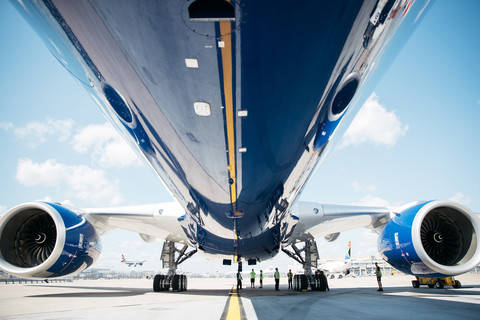UK aviation industry accused of giving ‘false hope’ on CO2 emissions

Air passengers are being sold ‘false hope’ that UK airlines will reduce their net carbon emissions to zero by 2050, a former airline director has claimed.
Sustainable Aviation, a body made up of UK airports and airlines, published a new report this week outlining steps the industry will take to eliminate its carbon footprint over the next 30 years, during which passenger numbers are expected to grow by 70%.
Measures to eradicate carbon emissions include the development of sustainable fuels, better use of airspace and introducing more modern, fuel-efficient aircraft – but the largest saving will come from carbon-offsetting schemes, a practice which has often been criticised as offering little or no reduction in CO2 emissions.
Sustainable Aviation said: "With these actions, the UK will be able to grow passenger numbers by 70% – in line with current projections – whilst reducing net emissions from 30 million tonnes of CO2 per year today down to zero."
However, Responsible Travel customer director Tim Williamson said the industry could not be left to regulate itself. Williamson, who was previously director of customer experience and marketing at Monarch, having earlier carried out a similar role at TUI UK, said: "Having worked at two airlines previously, it’s very clear that the industry is operating on very fine margins and therefore a strategy of growth is pursued aggressively in order to survive.
"It’s a fiercely competitive market so from the inside, charging more for seats feels unfathomable for airline bosses.
"With the increasingly urgent need to act on climate change, you can see why airlines have turned to carbon offsets as the ‘magic pill’ to solve their climate woes. However these schemes sell customers false hope – the ability to ease the collective guilty conscience for a ludicrously small additional cost.
"Emissions go on rising, which is the exact opposite of what’s needed. Any changes to this market must be government led – this is not an industry that can be left to regulate itself. We need a strong, government led aviation policy which places carbon reduction at the heart of any plan – managing demand through taxation and ensuring a level playing field for all competitors in the industry."
Ben Cordwell, a travel and tourism analyst at GlobalData, described the UK aviation industry’s target of net zero carbon emissions by 2050 as ‘ambitious’.
"Alternative biofuels still produce carbon dioxide and GlobalData figures forecast over 125 million passengers will fly to and from UK airports by 2023. An increase of over 16 million passengers from 2018 brings with it an enormous increase in carbon emissions, something that seems very unlikely to be offset through the planting of trees," he said.
"As recently as November 2019, whistle-blowers exposed the ‘fuel tankering’ scandal, a procedure that deliberately adds weight to flights, increasing carbon dioxide emissions. The process sees planes filled with extra fuel, usually to avoid paying higher prices for re-fueling at their destination airport. These kinds of procedures point towards an industry that has little interest in real action towards environmental sustainability.
"If airlines want the public to believe they are serious about tackling climate change, transparency is needed moving forward. Perhaps then, we will begin to see positive change within the aviation industry."
However, British pilots’ association BALPA welcomed the commitment by the aviation industry.
It said the plans laid out in a new Decarbonisation Road-Map, published by the UK Sustainable Aviation coalition, point towards smarter flight operations, new aircraft and engine technology, modernising UK airspace, the use of sustainable aviation fuels, as well as ‘high-quality market-based policy measures’ as a means of making the aviation industry greener.
BALPA General Secretary, Brian Strutton, said: "Pilots recognise the part the aviation industry has to play in the Government’s plan to reduce carbon emissions by 2050.
"At the same time, we know that aviation is a vital sector of the UK economy and this plan will allow the sector to thrive while controlling the impact it has on the environment.
"We are at the dawn of a new age of aviation technology. By committing to this plan to harness that cleaner technology and use airspace more efficiently we can reduce CO2 emissions without restricting growth."
 United Kingdom
United Kingdom United States
United States Asia Pacific
Asia Pacific












































Dozens fall ill in P&O Cruises ship outbreak
Turkish Airlines flight in emergency landing after pilot dies
Boy falls to death on cruise ship
Unexpected wave rocks cruise ship
Storm Lilian travel chaos as bank holiday flights cancelled